

2011 Sessions and Schedule - The Global Education Collaborative. Conference Sessions Full conference session descriptions and commenting areas are HERE.
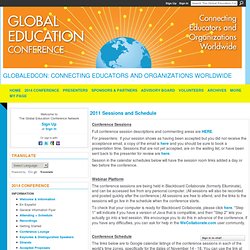
For presenters: if your session shows as having been accepted but you did not receive the acceptance email, a copy of the email is here and you should be sure to book a presentation time. Sessions that are not yet accepted, are on the waiting list, or have been sent back to the presenter for review are here. Session in the calendar schedules below will have the session room links added a day or two before the conference. Webinar Platform The conference sessions are being held in Blackboard Collaborate (formerly Elluminate), and can be accessed live from any personal computer. To check that your computer is ready for Blackboard Collaborate, please click here.
Conference Schedule. Using Holiday Celebrations to Promote Multiculturalism in Early Childhood Settings. Hi!
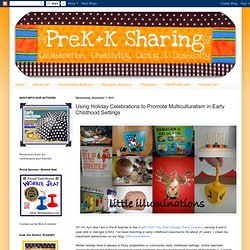
I'm Ayn and I am a Pre-K teacher in the Bright From The Start Georgia Pre-K program, serving 4 and 5 year olds in Georgia (USA). I've been teaching in early childhood classrooms for about 20 years. I share my classroom adventures on my blog, little illuminations. Winter holiday time is always a tricky proposition in community early childhood settings. Some teachers choose to ignore the holidays altogether, some celebrate only the commercial aspects of the holidays.
We recently celebrated the Muslim holidays, Ramadan and Eid Ul Fitr. In the coming weeks, we'll highlight a variety of cultures and traditions. We will celebrate Hanukkah, reading stories, playing dreidel games and learning songs. We will celebrate Christmas by singing carols, having our "Elf on The Shelf" visit, and playing lots of "reindeer games".
In January, we will learn about Chinese New Year. Travel the Globe with the World Atlas. Barefoot Books’ newly released World Atlas for children, written by Nick Crane and illustrated by David Dean, is one of those books that will grow with your child over time.
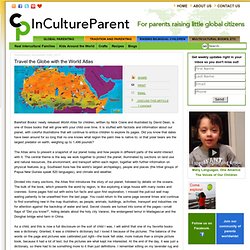
It is stuffed with factoids and information about our planet, with colorful illustrations that will continue to entice children to explore its pages. Did you know that dates have been around for so long that no one knows what region the palm tree is native to; or that polar bears are the largest predator on earth, weighing up to 1,499 pounds? The Atlas aims to present a snapshot of our planet today and how people in different parts of the world interact with it. The central theme is the way we work together to protect the planet, illuminated by sections on land use and natural resources, the environment, and transport within each region, together with further information on physical features (e.g. #Tech, #GlobalEd, & #EarlyEd News. Five for Friday: Getting a Global Education from Social Media - My Wonderful World Blog. / Teddy Bears. Ed Gragert: Global Competency Through International Interaction and Education. The world is capturing our national attention like no other time in recent years.
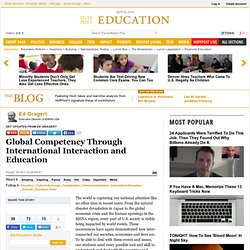
From the natural disaster devastation in Japan to the global economic crisis and the human uprisings in the MENA region, every part of U.S. society is visibly being impacted by world events. These occurrences have again demonstrated how inter-connected our societies, economies and lives are. To be able to deal with these events and issues, our students need every possible tool and skill to understand and deal with the countries and people undergoing these changes. These skills include the ability to work collaboratively to solve problems, familiarity with technology and an awareness of and respect for different cultures and languages. All of our students need these tools and skills, regardless of their future occupational field and current socio-economic situation. Administration officials undertook an assessment of existing programs and found significant programs in place.
Imagine the possibilities. 'Sesame Street' Arrives In Afghanistan. CFIS Kindergarten Holiday Card Exchange 2011-12. World News America - Why do Finland's schools get the. Finland's schools score consistently at the top of world rankings, yet the pupils have the fewest number of class hours in the developed world.

Last year more than 100 foreign delegations and governments visited Helsinki, hoping to learn the secret of their schools' success. In 2006, Finland's pupils scored the highest average results in science and reading in the whole of the developed world. In the OECD's exams for 15 year-olds, known as PISA, they also came second in maths, beaten only by teenagers in South Korea. This isn't a one-off: in previous PISA tests Finland also came out top. The Finnish philosophy with education is that everyone has something to contribute and those who struggle in certain subjects should not be left behind. Big Thinkers: Linda Darling-Hammond on Becoming Internationally. Linda: In the United States now, we're talking a lot about international competition, internationally benchmarked standards and so on.
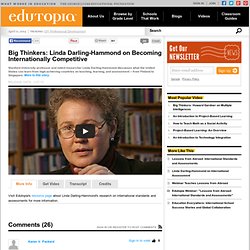
And I wanted to see what is actually happening in terms of teaching and learning in other countries. So I've looked at a lot of high-achieving countries, and it became very clear to me right away that the issue is not just the standards that are written on paper. TakingITGlobal - Inspire. Inform. Involve.